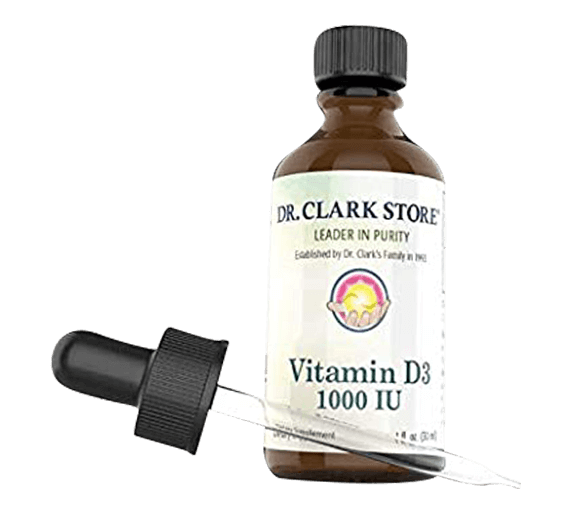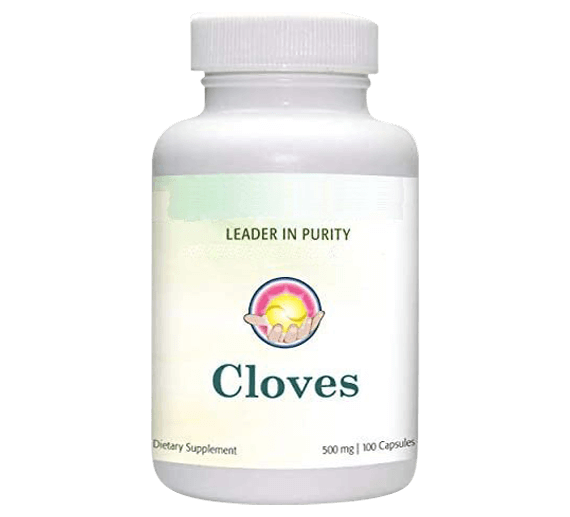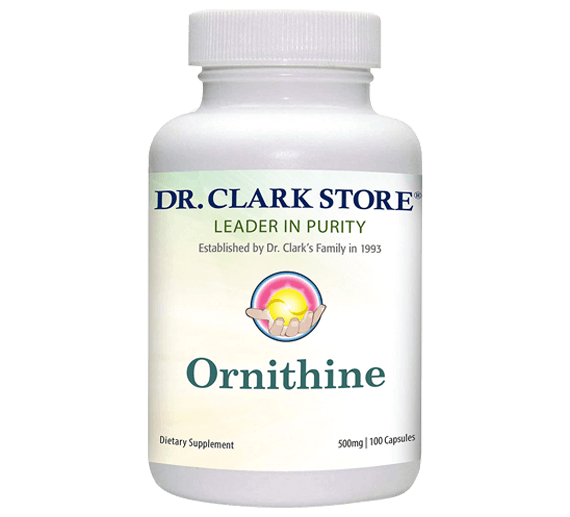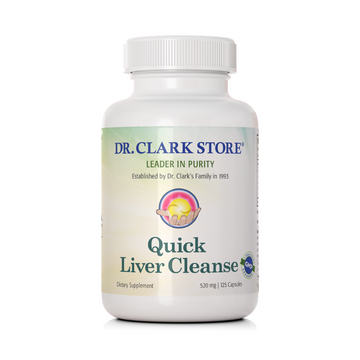Description
Vitamin D3 1000IU 1 fl oz (approx. 600 drops)
Our super pure Vitamin D is now 100% olive oil and coconut based and does not contain corn oil. Vitamin D helps the body to regulate the transport of calcium from the digestive system through the bloodstream to bone. It also assists in the retention of calcium and phosphorous. Vitamin D helps maintain normal bone and tooth formation. SHRC Vitamin D is 100% natural cholecalciferol. The dry form is specially formulated for easy absorption.
Special Note:
We do not put the glass dropper right into the bottle, like most other companies. Due to the fact that Dr. Clark finds that the rubber bulb can pollute the ingredient in the bottle with rubber particles we put an HDPE lined cap on the bottle before we ship it to you. The glass dropper is the easiest way to dispense Vitamin D from. Simply replace the cap with the glass dropper and make sure that the bottle never turns upside down. If you want to travel with the Vitamin D, we have enclosed an HDPE bottle for your convenience, simply transfer some of the vitamin D to that bottle.
Vitamin D Drops (Cholecalciferol). Vitamin D—the sunshine vitamin—is a fat-soluble vitamin found in food. Vitamin Dpromotes the body’s absorption of calcium, essential for normal development of healthy teeth and bones. Vitamin D occurs naturally in dairy products such as cheese, butter, cream and is found in fortified milk (all milk in the U.S. is fortified withVitamin D). It is also found in fish, oysters and fortified cereals. Cod live oil is an excellent source of Vitamin D. A Vitamin Ddeficiency may lead to osteoporosis in adults or rickets in children. The olive oil in Vitamin D Drops is extra virgin, unrefined olive oil.
Vitamin D has been rediscovered!
Brain, bone, cardio, anti-aging, and cancer researchers all say vitamin D is essential! New astounding information has been surfacing in medical journals and medical conferences the last two years. 70% of Americans may be deficient. European Journal of Clinical Nutrition found that all women could benefit from more vitamin D in the diet regardless of their skin tone or country of residence.
General guideline from researchers is that people take in up to 600 IU of vitamin D each day, depending on age. Journal of Internal Med 2000; 247: 260-268 states that RDA of 1000 IU should be adopted when sunlight exposure is limited. Experts also point out that you may want to test yourself for vitamin D deficiency to establish how much you want to take. We are unaware of any reports of vitamin D toxicity caused by people taking to much vitamin D although vitamin D can be toxic in overdose of above approximately 20,000 IU a day over a prolonged period of time. The correct test is called 25(OH)D, same as 25-hydroxyvitamin D.
Vitamin D promotes healthy bones and teeth. Everyone knows that, but deeper insight into Vitamin D’s wider role in our health is relatively new. Researchers are discovering that Vitamin D also promotes normal cell growth and helps maintain hormonal balance and a healthy immune system. Moreover, definite links have emerged between Vitamin D deficiency and obesity, insulin resistance, heart disease, certain cancers and depression. And experts now agree that the DRI’s for Vitamin D are far too low, particularly for people who don’t spend much time in the sun.
Children with rickets
Awareness of Vitamin D first took center stage in the early part of the 20th century. Children with Vitamin D deficiency developed rickets, a condition where the body fails to mineralize bone. This led to the daily dosing of children with cod liver oil, and manufacturers began to fortify milk and cereal with Vitamin D as well. By the 1960’s, rickets had become a relatively rare disease. Today, most commercial milk producers fortify their products with Vitamin D, and many orange juice makers are doing the same. But the catch is, you’d have to drink gallons a day to reach optimal levels. That’s just too much milk or juice for most adults.
The Sunshine Vitamin
Your body can’t create Vitamin D on its own. Instead, it’s designed to make this important vitamin through sun exposure. Until modern times, human beings spent a great deal of time outdoors. But today many of us work inside sealed buildings with glazed windows, and we wear sunblock when we go outside. Unfortunately, any glass windows or sunblock with an SPF above 15 will block the UVB rays essential for Vitamin D conversion.
Mood swings
An interesting area of Vitamin D research is its relationship to depression. Seasonal affective disorder, or SAD, is a situational mood disorder brought on by decreasing daylight in the winter months. High doses of Vitamin D during these months have proven to be a very effective natural remedy for SAD. Vitamin D levels are inversely related to those of melatonin. Melatonin helps modulate your circadian rhythms. Insomnia, mood swings and food cravings are all influenced by melatonin. Sunlight shuts melatonin production off, while triggering release of Vitamin D, which is why doctors recommend getting outdoors as a remedy for jet lag.
What you can do to prevent Vitamin D deficiency
Get out in the sun. Is healthy sunbathing possible? Of course it is. During the summer months, even as little as 15 minutes in the sun (without sunblock!) in the early morning and late afternoon is enough for most light-skinned individuals to manufacture an ample supply of Vitamin D. Darker skin may require up to 40 minutes. Eat a diet rich in whole foods. Nutrient-dense, fatty fish like salmon, mackerel and sardines are good sources of Vitamin D. Egg yolks, fortified organic milk and other dairy products, and some organ meats (like liver) are also reasonably good natural sources of Vitamin D. Take a top-quality multivitamin every day.
Take a Vitamin D supplement
Understanding your own individual needs and levels of tolerance for Vitamin D are important parts of healthy self-care. Remember—your health is a work in progress that needs your consistent attention and support.
References
1.Cranney A, Horsley T, O’Donnell S, et al. (Scientific American, August 2007). “Effectiveness and safety of vitamin D in relation to bone health”.
2.Tavera-Mendoza LE, White JH (Scientific American, November 2007). “Cell defenses and the sunshine vitamin”. 3.Spence, Jean, T. and Janet R. Serwint. “Secondary Prevention of Vitamin D-Deficiency Rickets” (Pediatrics 113 January 2004).
4.Endocr Pract. 2009 Jun 2:1–16. “Is Vitamin D the Fountain of Youth?”
While many people are Vitamin D deficient, some are not. Please talk to your health care professional before taking this product, ask for a Vitamin D test.
Warning
Vitamin D can be toxic if taken in high amounts. Human toxicity probably begins to occur after chronic daily consumption of approximately 40,000 IU/day.
Keep away from children.
Keep container tightly closed in a cool, dry, and dark place.
The use of this herbal supplement is a traditional nutritional use that is not intended to be prescribed for, or to treat any disease, and does not claim to cure any disease, including diseases involving fevers, colds, flu or invading organisms.
Caution: As with any dietary or herbal supplement, you should advise your health care practitioner of the use of this product. If you have ulcers, gallstones or are nursing, pregnant, or considering pregnancy, you should consult your health care provider prior to taking this product.
Vitamin D 1000 IU (cholecalciferol)
250% daily value (% Daily Value NOT Established)
Approximately 600 drops
Other Ingredients
Olive Oil
Coconut Oil
Suggested Use
Adults and Children 12 or over, take 1 drop per day or as directed by a healthcare professional.
While many people are Vitamin D deficient, some are not. Please talk to your health care professional before taking this product, ask for a Vitamin D test.
Warning
Vitamin D can be toxic if taken in high amounts. Human toxicity probably begins to occur after chronic daily consumption of approximately 40,000 IU/day.
Caution
As with any dietary or herbal supplement, you should seek advise from your health care practitioner on the use of this product, especially if you are nursing, pregnant, or considering pregnancy.
Keep away from children. Keep container tightly closed in a cool, dry, and dark place.
Additional information
| Weight | 1 lbs |
|---|





